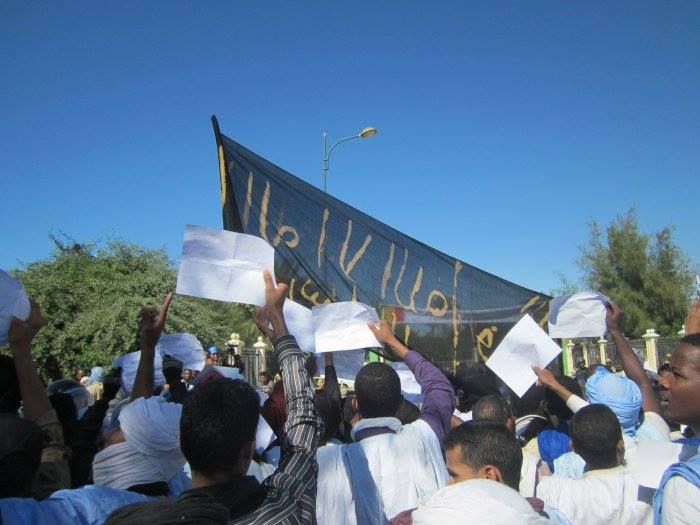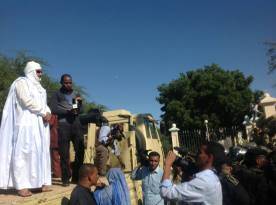As the wealthy upper management of Canada’s Kinross Gold were celebrating Christmas, a large group of almost 300 members of its workforce at the Tasiast operation in Mauritania received the unwelcome news that they were being laid off. The official line is that this was all part of a necessary strategy to cut costs and reduce operational capacity, and is also related to a fall in the price of gold.
The workers in Mauritania say they have not been treated fairly, that collective redundancies are not legal, and that they have a raft of additional issues which need to be addressed. One worker told a local reporter that he received his notice while taking his first vacation from work in six years. Another got the news while still undergoing medical treatment for an industrial injury. Several of those laid off had been encouraged to take out large bank loans, the status of which is now a major problem.
Frustrated by the lack of reaction, a group of workers began an open-ended sit-in outside the Presidential Palace in Nouakchott on December 25 to demand a hearing and request fair treatment under the prevailing law. As usual, a representative from the office of President Aziz came out to receive the demands of the delegation, but returned to say Aziz would not grant them an audience. The protesters remained in place, throughout the bitterly cold nights. After the sit-in continued for some days without redress from the company or action by the authorities, local activists and concerned members of civil society went to sit with them and show solidarity, and returned on January 5 to take part in a human chain of protest, as shown in this photo gallery.
Click to view slideshow.
The media responded with a blanket of silence – the mining companies in Mauritania are big spenders when it comes to advertising contracts. The parties of the political opposition likewise had little to say.
Then, late on Thursday 9 January, the sit-in had a visit from the police. The mining workers were told they must leave the area because President Keita of Mali was coming to pay an official visit and they were making the place look untidy. Naturally, they refused to budge. Another group of unrelated protesters who were in the same location that evening did comply with police orders to vacate the area.
At around 02:55, the riot squads arrived in eight vehicles and, after talking quietly with the workers for about 15 minutes, launched a sudden violent attack, using batons and tear gas. After two brutal hours of police repression against the workers from Tasiast, and the activists who rushed to their side in support, there were about a dozen people injured. Four men with more with serious injuries were refused treatment, through the combined obstruction of medical staff at the National Hospital and the police. Several protesters were robbed of cash and mobile phones by the police while being searched; an amount of 400,000 MRO has been reported. The police also confiscated blankets, rugs, clothes and cooking gear from the sit-in.
Police released about 10 workers arrested during the raid and the running battle in the streets of Nouakchott which ensued; the rest were released later. There was no media presence the entire time, only activists from Mouvement du 25 Février (m25fev) and La Jeunesse de RFD trying to document events. One of the m25fev activists was injured quite seriously in the shoulder and was detained by police for about 2 hours.
The protests in the capital continued on Saturday 11 January, despite the previous day’s violence. The protesters switched location to stand outside the Kinross office in Nouakchott, but an activist reported to a local journalist that the management there called the police, claiming the protesters were throwing stones – which the activist strenuously denied. Police cordoned off the area and there was a report that tear gas was used again.
This issue is being systematically ignored, while far larger “Islamic” protests are being orchestrated in Nouakchott and Nouadhibou to demand the application of Sharia law against the author of a recent blog post which was critical of the Prophet Mohammed (PBUH).
These protests are growing in size and turning violent. On Saturday 11 January in Nouadhibou, three injuries – including one police officer – were reported after clashes with police. The previous day, that town saw large protests with tyres being burned, cars and shops vandalised, as police used tear gas to disperse the protesters. Local journalist Ahmed Salem was beaten and arrested by police. In Nouakchott, hundreds marched to the palace and the president came down to address the crowd, and remind them that Mauritania is an Islamic Republic which already uses Sharia.
Deeply reminiscent of the book burning incident of May 2012, this Aziz PR stunt has drawn immediate censure across the board, including from some highly influential commentators. Although the worst of the criticism was reserved for Aziz, there was some remaining for an obviously false claim by one (barely legitimate) news site that Al Qaeda flags had been spotted in the Nouadhibou protests, which is being resoundingly refuted. There is also mounting concern about the decidedly un-Islamic behaviour of robberies and violence being reported.
As for the alleged reason for these massive, repeated, protests, the offensive article, this is a most unusual situation and one which is perhaps too easily exploited. The supposed author of the article was arrested over a week ago, and was sent to the High Court for arraignment a few days later, after admitting to writing the item in question. He is said to have been charged with apostasy, which is covered in Article 306 of the current penal code. He can be fined and sentenced to prison if he makes a public apology, or he can refuse and be sentenced to death. He has already issued a written retraction and apology before being arrested (or taken into protective custody, depending on the source). No one has been executed in Mauritania for decades.
These twinned sagas will continue, the redundant Tasiast workers will be ignored, while demanding redress under a law which exists but probably doesn’t apply to their specific situation; and the devout Muslims will be showered with attention, demanding introduction of a law that would be redundant because one already exists and is being applied. By Tuesday, 21 January, the day assigned as the anniversary of the birth of Mohammed (PBUH), this particular powder keg could be set to explode.
Filed under: Activism, Canada, Events, FaceBook, Ghana, Human Rights, Mauritania, Twitter, Updates Tagged: Human Rights, Kinross Gold, Mauritania, protests, Tasiast
via @lissnup on WordPress


No comments:
Post a Comment
Note: only a member of this blog may post a comment.